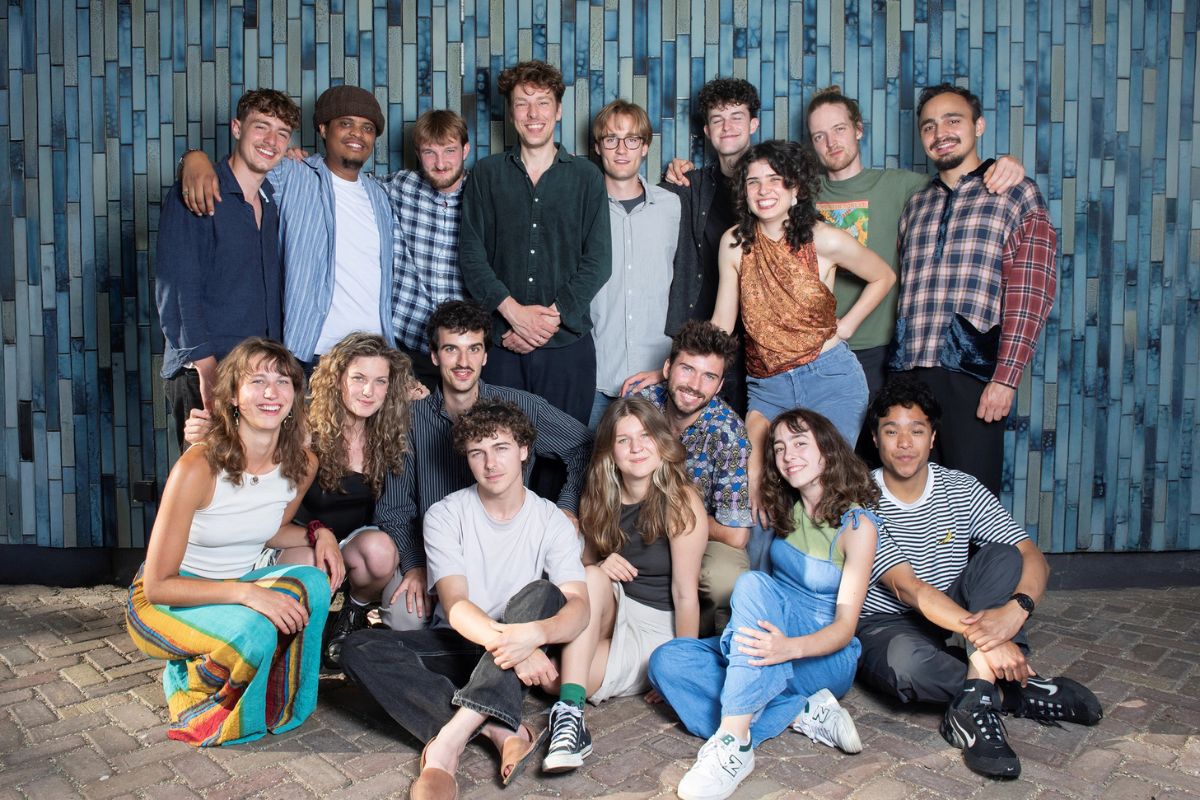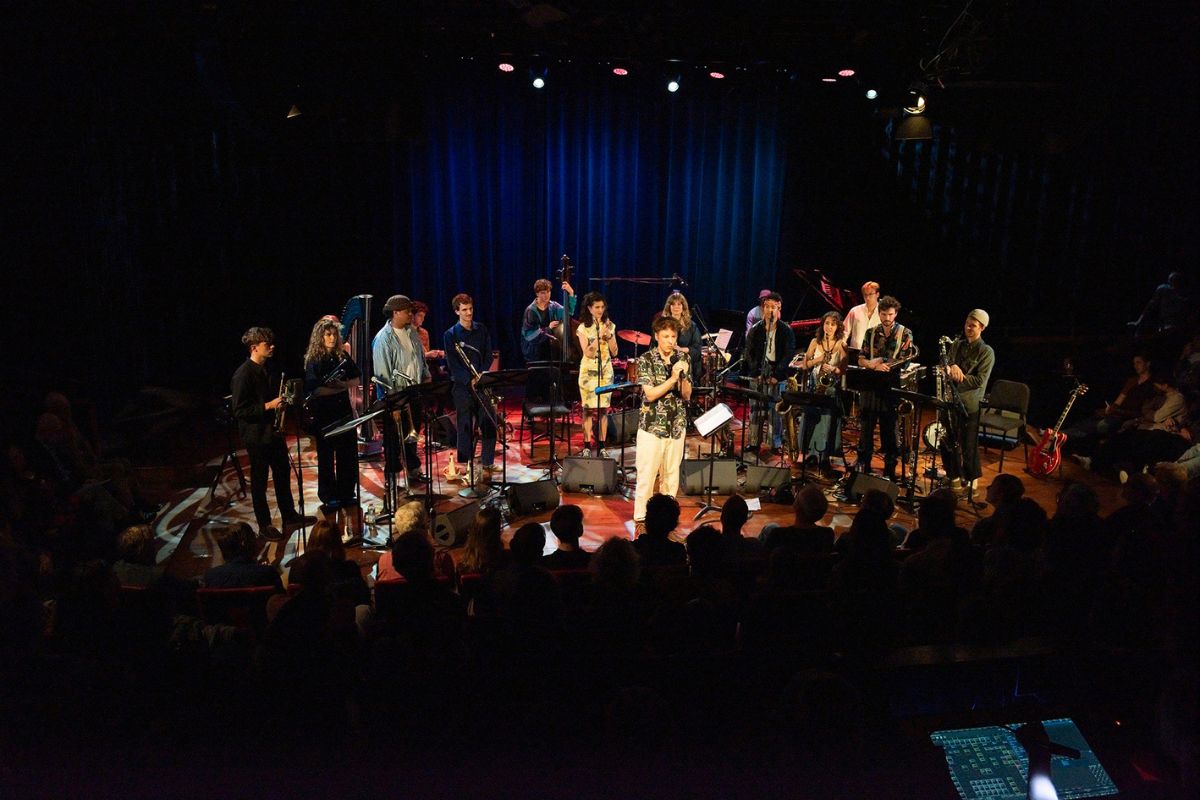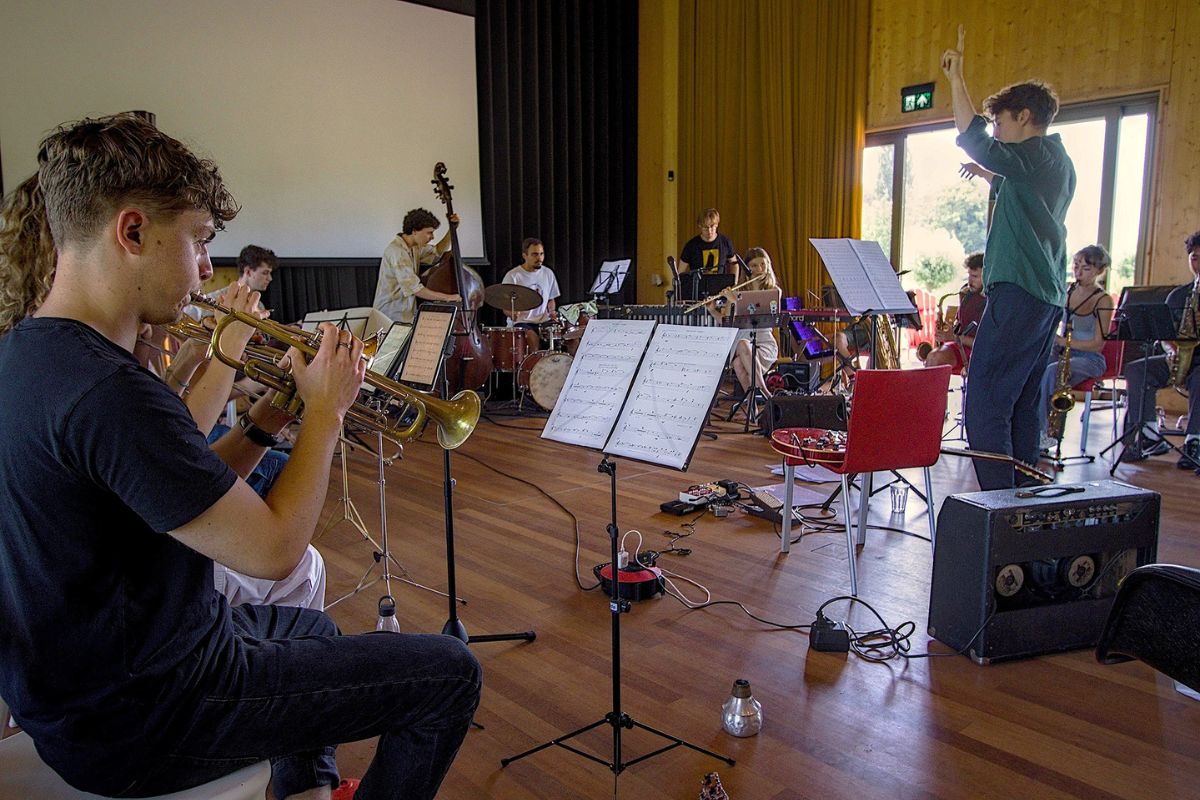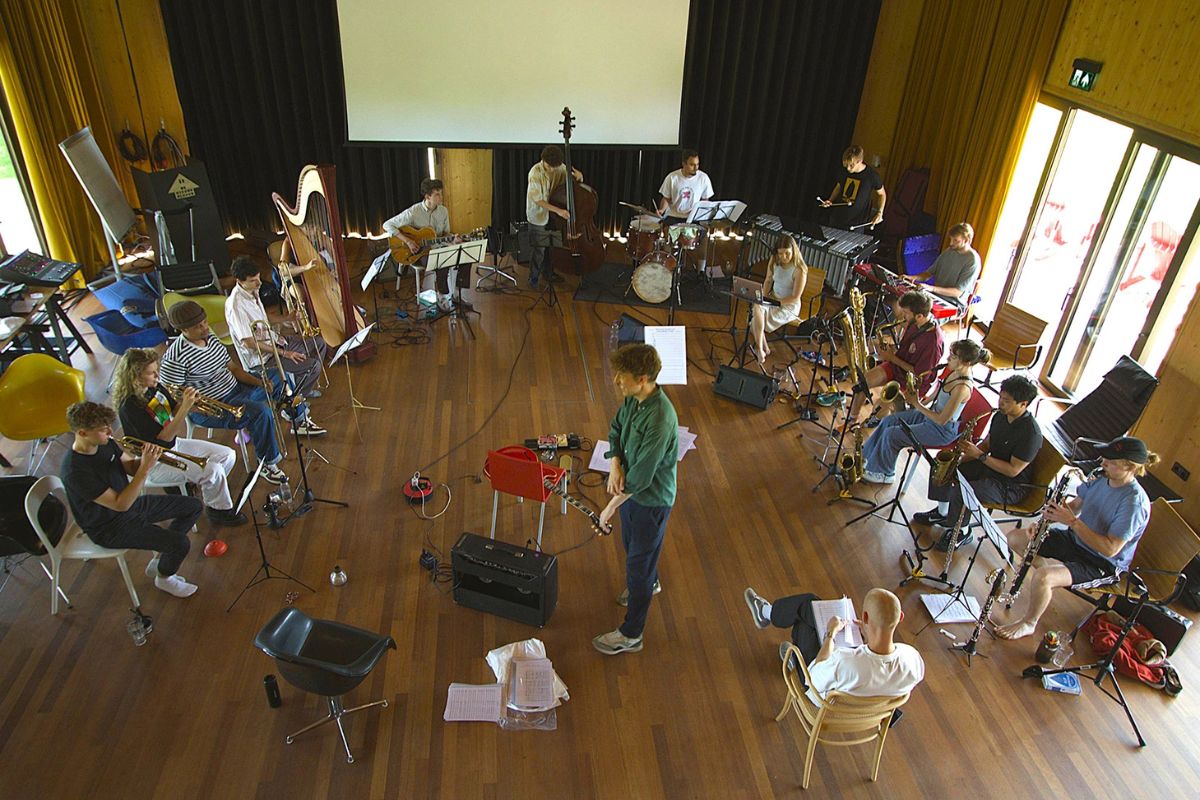‘I feel extremely fortunate to have musicians of such profound musical maturity under my wing’
Interview with Reinier Baas, artistic leader of NJJO

Eclectic
Meaningful music
This mysterious force
In 2025 and 2026, Amsterdam-based guitarist and composer Reinier Baas is leading the ninth line-up of the Nationaal Jeugd Jazz Orkest (NJJO). As became clear during their first concerts together, he is not afraid to challenge the young musicians with an ambitious selection of compositions. In fact, Reinier makes composing and arranging an integral part of his two-year appointment. Just before NJJO’s free (lunchtime) concert in Utrecht – a preface to festival Orange Jazz Days – we asked him about his work with NJJO and the book on composition he is writing.
When you were asked to lead the NJJO for the two-year period, did you feel reluctance or immediate enthusiasm?
‘Immediate enthusiasm! I’ve worked with a previous edition of the orchestra as a soloist, when Benjamin Herman was in charge of proceedings. These are some of the greatest memories of my life in music. I’ve also made a few of the arrangements for other editions. The philosophy of the NJJO is one that I subscribe to completely. A lot of responsibility and trust is given to the musicians, which is extremely encouraging and helps them thrive. The orchestra gives young musicians an opportunity to play at some of the most renowned venues in Holland and abroad. I consider it an honour to be the artistic leader for this edition.’
Opus Kaleidoskopus, the NJJO in concert
- 3 October, TivoliVredenburg, Utrecht (free lunch concert)
- 5 October, LantarenVenster, Rotterdam (2 Nations Under One Groove)
- 11 October, Gooiland, Hilversum (opening Pop & Jazz Hilversum)
The Nationaal Jeugd Jazz Orkest (NJJO) consists of 16 musicians from the Netherlands and abroad, all under 26.
- Lezaam Beets – trombone
- Sara Brink Nielsen – harp
- Irene Caumel Carrasco – alt & bariton saxophone
- Laura van Eerd – trumpet
- Evan van der Feen – piano
- Ton Felices – double bass
- Romain Gachot – trumpet
- Carolina Gemmel – vocals
- Youk den Haan – guitar
- Dion Hoorn – saxophone
- Maximilliano Horcajo – trombone
- Max van Houtum – saxophone
- Karlina Priedena – vocals, flute
- Alejandro Martin Puchau – drums
- Rasmus Vik Lakerberg – vibraphone
- Nick van der Woude – clarinet
More information on the NJJO website.
“A lot of responsibility and trust is given to the musicians,
which is extremely encouraging and helps them thrive.”

Eclectic
Was the aspect of composing with the orchestra members on your mind from the start?
‘Although the idea of encouraging members of the orchestra to write and arrange themselves was there from the get go, other ideas came later. Cees Gog, who is the manager of the NJJO, and I received an application from a few young composers and arrangers. This led us to develop a little program for two talented young arrangers – another one of the applicants was hired for two arrangements on the spot! We will kick things off with a “laboratory day” with the orchestra early 2026, where they get to try their pieces. In preparation of this, they will be coached by myself and one of the other NJJO arrangers.’
I saw your concert with the NJJO in BIMHUIS and I remember thinking: what a mixed bag of compositions is this set list. A couple of your tunes, a Mengelberg piece, a few originals brought in by Evan van der Feen, who is the orchestra’s pianist. Was this first half year of your tenure a testing ground as well? It seems the orchestra can go many places now.
‘I feel extremely fortunate to have musicians of such profound musical maturity under my wing, this edition. They are able to deal with all kinds of styles and genres. The program’s name, Opus Kaleidoskopus, references the eclectic nature. With all of these different pieces, improvisation and the musicians’ personalities are the unifying force. Evan is a highly gifted composer. His music – with lyrics by Carolina Gemell, one of our singers – fits the aesthetic of the orchestra really well.’

Meaningful music
What did you learn from the Orchestra members so far? And what do you hope the musicians get out of it?
‘Even though we have only worked together for a few months on and off, I feel like the group is really tight-knit. What I admire in all of them, is their ability to shed their ego and put the collective first. They are much more mature and reliable than I was at their age myself (but don’t tell them I said this).’
‘What I hope to give them is a deep sense of trust and encouragement. I want them to know that what they are doing is meaningful, and that music is a powerful force for good.’
Overseeing your own work, from fragile duo material with Ben van Gelder to outrageous arrangements for big band and orchestra, what is most dear to you, what is closest to your heart?
‘I feel very fortunate to have experienced working with all kinds of line-ups. Although the objective is always the same, namely making meaningful music, the process changes quite a bit as the number of people involved increases. With a full orchestra, there is less opportunity to make things up on the spot. But the feeling of having a 53-piece orchestra like Metropole Orkest blow your socks off is unlike anything else I’ve ever experienced. I think with our 16-piece large ensemble for NJJO, we have arrived at a line-up that is both flexible and capable of giant sonic explosions.’

This mysterious force
You are working on a book on composition. Please tell me more.
‘With pleasure! I am working on a composition method that I call The Parameter Approach. In short, it is a method for practicing composition, aimed at integrating ideas from the music you love into your own work without copying it outright. It is meant to help students develop a more healthy relationship with their output by producing large quantities of (practice) pieces, help them bridge the gap between their imagination and its manifestation in reality and to ultimately become students of their own ideas. It is a call for students to approach composition as something that requires a lot of practice. The romantic idea that a fully formed composition that expresses your deepest inner world might simply hit you in the face while on a long walk along the Seine river at your first try is very far removed from reality. Inspiration needs to find you working – although the process can be light and playful as well!’
‘If all goes according to plan, I will put it out in the first half of 2026. The bulk of it was written with support from the Conservatory of Amsterdam, who granted me a position in their short-term research program for one year.’
You mentioned during a workshop on composition that one of your favourite songwriters is Big Thief’s Adrianne Lenker. But my goodness, that is not jazz!
‘I’m happy you mention her. With Adrianne Lenker’s music, most notably her album Songs, I have a hard time describing why it moves me so deeply. In my practice as a composer, musician and teacher, I am often confronted with this paradox that that which can be described, and therefore taught, gets emphasized perhaps too much. Thankfully, analysis and intellect have their limits in arts and music, and there is this ‘other thing’ that defies description, other than maybe through music itself. To me, Adrianne Lenker’s music has this enormous emotional significance, and I’m not sure I could tell you why – although the lyrics are part of the equation.’
‘I think improvisation brings something unique to the table. But ultimately, this mysterious, but deeply human and connecting force is what lies at the heart of most music I am interested in, no matter the genre.’
Text by Mark van Schaick